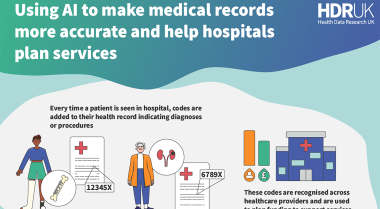An Informatics Consult approach for generating clinical evidence for treatment decisions
25 March 2021
With the support of HDR UK, a team of researchers have demonstrated that it is possible to create a clinically useful system that accesses electronic health records (EHRs) to produce novel on-demand evidence for doctors using similar cases.

Overview
There are major evidence gaps on the best treatment for patients with multimorbidity where the preferred treatment for one condition may be contraindicated for another. The first research of its kind in the UK suggests that an Informatics Consult approach could help – allowing clinicians to access evidence from sources including patient records of similar cases.
Challenge
Clinicians are increasingly faced by patients with multimorbidity and the dilemma of how to respond when the treatment indicated for one illness is contraindicated for another. Drug trials often specifically excludes patients with multimorbidity, so firm evidence can be in short supply. Care team members from different disciplines may also have differing perspectives on the best course of action.
Yet, there much relevant real-world data may be locked up in NHS patient records, as clinicians will have been faced by “patients like me” before and will have recorded the decisions and outcomes. Other research that clinicians may not have the opportunity to access may also be valuable.
These could provide guidance for clinicians, but there is an immense challenge in accessing and collating the data, especially with enough speed to inform decisions.
Solution
HDR UK supported a team including associate researcher Dr Alvina G Lai (a lecturer at the UCL Institute of Health Informatics) to carry out a proof concept study into an Informatics Consult approach. They demonstrated that it might be possible to create a clinically useful system that accesses electronic health records (EHRs) to produce novel on-demand evidence from similar cases.
The resulting research (available in pre-print) tested the idea by focussing on treatment using warfarin for patients with both atrial fibrillation (indicated) and liver cirrhosis (contraindicated). The team created a prototype EHR request form and carried out a manual search for results (including a meta-analysis of observational studies).
Learnings
The study gathered data and presented it in a form that 85% of an independent sample of 34 clinicians said would be useful in prognosis. Some 79% said they believed they should have access to an Informatics Consult service.
Impact and outcomes
Dr Lai believes there is the potential to build an on-demand system providing clinicians with an “overview” to augment decision-making.
Work is underway at UCLH NHS Foundation Trust to see if an automated process can be created and embedded within EHRs.
The team further hopes to stimulate discussion among public, professionals and policymakers about realising the potential for learning using data about “patients like me”.
Further information
Aims and priorities
This research addresses the HDR UK priorities of:
- Improving evaluation of safe, effective, affordable treatments for patients
- Improving healthy life expectancy for people living with a common disease
- Developing and applying advanced health data science to address major health challenges.
It also fits the research objectives for:
- Improving public health
- Better care
- Applied analytics
Abstract
From large scale health data resources, tailored to the treatment of a specific patient, with return of results in clinical timescales. However, the availability of such consultations is lacking. We seek to provide an Informatics Consult for a situation where a treatment indication and contraindication coexist in the same patient, i.e., anti-coagulation use for stroke prevention in a patient with both atrial fibrillation (AF) and liver cirrhosis. We examined four sources of evidence for the effect of warfarin on stroke risk (efficacy) or all-cause mortality (safety) from: (i) randomised controlled trials (RCTs), (ii) meta- analysis of prior observational studies, (iii) trial emulation (using population electronic health records (N = 3,854,710) and (iv) genetic evidence (Mendelian randomisation). We developed prototype forms to request an Informatics Consult and return of results in electronic health record systems. We found 0 RCT reports and 0 trials recruiting for patients with AF and cirrhosis. We found broad concordance across the three new sources of evidence we generated. Meta-analysis of prior observational studies showed that warfarin use was associated with lower stroke risk (hazard ratio [HR] = 0.71). In a target trial emulation, warfarin was associated with lower all-cause mortality (HR = 0.61) and ischaemic stroke (HR = 0.27). Mendelian randomisation served as a drug target validation where we found that lower levels of vitamin K1 (warfarin is a vitamin K1 antagonist) are associated with lower stroke risk. A pilot survey with an independent sample of 34 clinicians revealed that 85% of clinicians found information on prognosis useful and that 79% thought that they should have access to the Informatics Consult as a service within their healthcare systems. We identified candidate steps for automation to scale evidence generation and to accelerate the return of results within clinical timescales.



